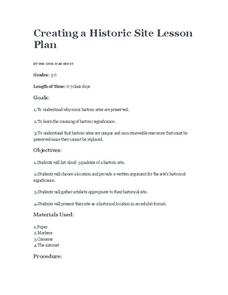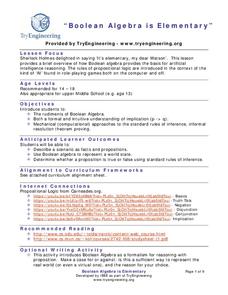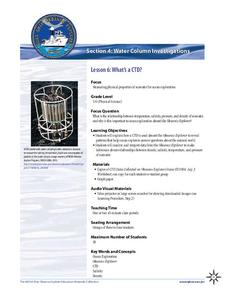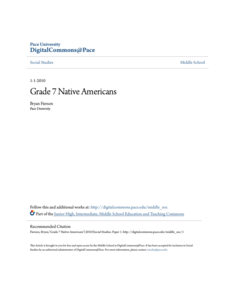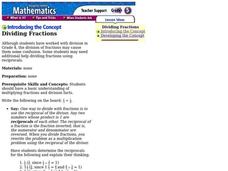Curated OER
Science and Cloning
Here is an ambitious lesson which has learners take a look at which nations came up with the most important scientific inventions/advancements during the 20th century. Focusing on group work, cloning is explored. All of the worksheets...
BioEd Online
Arm Model
Arm your young scientists with knowledge about anatomy as they build their own model of the elbow joint. Help them get a firm grasp on how muscles and bones interact to allow movement as they try different positions for the muscles on...
Baylor College
Energy for Life (Energy from Food)
Energy comes in many forms, but how do living things get the energy they need to survive and thrive? In a simple, controlled experiment with yeast, water, and sugar, groups make observations about how yeast reacts with water alone, then...
Civil War Trust
Creating a Historic Site
A historic site marks a place where a relevant historical event occurred, no matter how many people know about it. Small groups choose their own historical sites, including a place where a class member was born, or even a...
EngageNY
Grade 9 ELA Module 3, Unit 2, Lesson 8
Learning about research can be as important as learning about the topic itself. As ninth graders continue their guided research projects from Temple Grandin's Animals in Translation, they discuss their possible inquiry paths with group...
Rainforest Alliance
Investments in Forest Carbon
One hundred metric tons of CO2 can accumulate in one acre of forest over time—that's a lot of carbon! In the activity, groups of middle school learners determine what makes forests important. They then solidify the concept by using a...
WindWise Education
How Does Energy Affect Wildlife?
Is wildlife affected the same way by different electricity generation methods? Teams work together to research four electricity generation sources and their impacts on wildlife. The teams create a summary report and share their...
TryEngineering
Boolean Algebra is Elementary
See how Boolean algebra relates to video games with a lesson that teaches young scholars how to use Boolean algebra to create rules for a virtual world. They test the rule base for consistency in groups.
NOAA
What's a CTD?
Why are the properties of the water important when exploring the ocean? Young scientists discover the tools and technology used in deep sea exploration in the fourth installment in a five-part series. Groups work together to...
California Department of Education
Hitting the Write Note: Writing a Proposal
To whom it may concern ... Scholars undergo the process of writing a letter to an authority figure. The lesson asks writers to compose a formal letter requesting a music therapy space. Pupils learn how to submit a project proposal to any...
Pace University
Native Americans
Introduce middle schoolers to the First Nations that inhabited the Northeast during the Age of Exploration with a series of activities designed for differentiated groups.
EngageNY
Reading about Freaky Frogs: “The Amazon Horned Frog"
The Amazon Horned Frog is the focus of a activity designed to encourage readers to ask and answer questions. A frog-themed poem opens the door to a whole-group discussion. Following a read-aloud of an informational text, a three-page...
Judicial Branch of California
Our Government Today…What A System!
A group of citizens in North Canada has decided to leave their country, and they are asking for help in setting up an American-style democracy. Using a carefully structured activity, pupils lay out the principles in the American...
ReadWriteThink
Heroes Are Made of This: Studying the Character of Heroes
What makes heroes and villains? A six-part unit plan asks young scholars to explore the concept of heroism and the characteristics they consider heroic and unheroic. Groups create character maps that focus on how characters are shaped by...
National Woman's History Museum
Red Power Prevails : The Activism, Spirit, and Resistance of Native American Women
Native American women powered the American Indian Movement and other social changes, but they are often forgotten by history books. Examining a series of resources, including a documentary film, photographs, secondary sources, and social...
Global Oneness Project
Cultural Heritage: Recording a Native Language Dictionary
How do you rebuild a language that has been banned for years? A short video introduces high schoolers to Marie Wilcox, A Wukchumni Native American from Central California who, for over 20 years, worked on comprising a dictionary of the...
Curated OER
Dividing Fractions
Reciprocals are the method used for dividing fractions in this instructional session. A fraction is defined as being a division problem, and then the whole group works together to solve several problems. They check for the reasonableness...
Media Smarts
Unit Two: Celebrities and World Issues
Develop media smarts by considering the power of celebrity involvement in world issues. A look at the work of such celebrities as Angelina Jolie, Oprah, and Bono prepare learners to develop their own media campaign for a global...
Fredonia State University of New York
Watch Your Step…You May Collide!
Can two lines intersect at more than one point? Using yarn, create two lines on the floor of the classroom to find out. Cooperative groups work through the process of solving systems of equations using task cards and three different...
Code.org
Creativity in Algorithms
Groups work with the program they built in the previous lesson to make it more creative. The resource challenges pupils to add functionality to their existing programs by adding a new command.
Gobal Oneness Project
Sports for Social Change
After watching a short online film about a soccer player Nolusindiso Plaatje and his help with the Grassroot Soccer program, a community education effort aimed at spreading awareness about HIV/AIDS prevention, use a lesson...
US Institute of Peace
Perspectives on Peace
Is peace simply the absence of war, or is there more to the story? Young social scientists define peace in the second installment of a 15-part series. Groups work together to explore cultural concepts of peace and the peacemaking process...
State Bar of Texas
Mendez v. Westminster and Delgado v. Bastrop ISD
You arrive at school only to be told you have no place there. Scholars research the Supreme Court cases Mendez v. Westminster and Delgado v. Bastrop ISD, both dealing with school segregation. Two short video clips as well as small group...
EngageNY
Determining Cascading Consequences Using The Omnivore’s Dilemma: Industrial Organic Food Chain
Organic versus conventional farming: which option is best? Pupils use Michael Pollan's The Omnivore's Dilemma to determine the cascading consequences of the industrial organic food chain. They work in research teams to create an...
Other popular searches
- Cooperative Group Work
- Small Group Work
- Modeling Group Work
- Group Work Maths
- Group Work Rubric
- Group Work Lesson Plans
- Group Work Language Arts
- Group Work Dna
- Group Work Poverty
- Grading Group Work
- Group Work Peer Evaluation
- Cooperative Group Work Math





